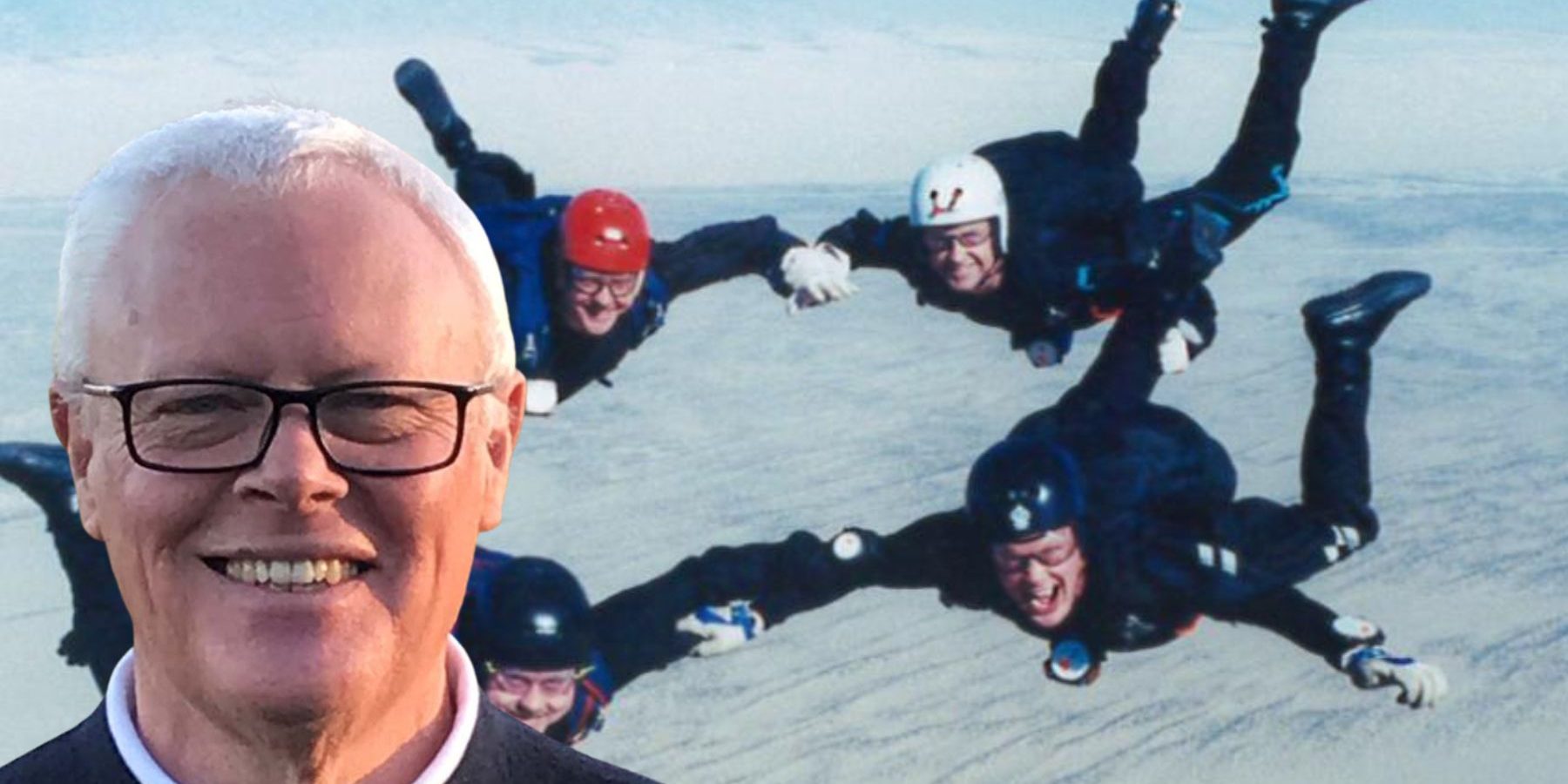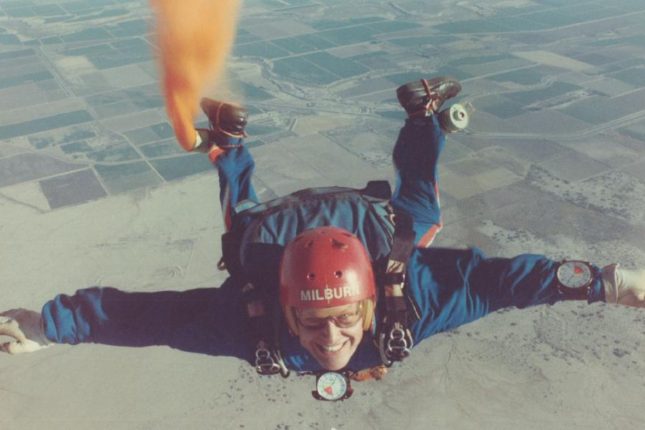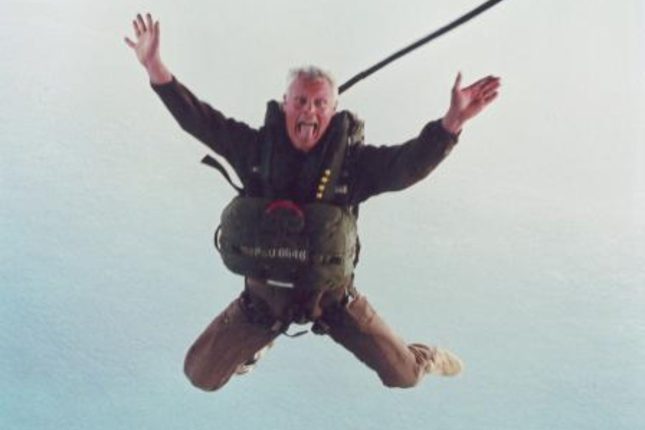Q & A with Mike Milburn - Club Chaplain
With rumours circulating that Club Chaplain Mike Milburn had led an adventurous life we thought we'd find out more to inspire others, especially our older teenage players who face so many life choices.
(THE EARLY YEARS)
Where were you born?
Hartlepool is my hometown, I lived there until the age of 18 when I moved to start teacher training.
Who were your parents and what did they do?
My father (Jim) worked for British Steel; he oversaw the Apprentice Training School at British Steel, Hartlepool. He was also President of Hartlepool Old Boys’ Rugby Football Club. My mother (Muriel) was a driving instructor. I should also add that I am an identical twin to Tony who was a PE teacher and outdoor pursuits instructor; he was a very talented scrum half to my fly half and played for Old Boys, Tynedale and Durham County.
Where did you go to school (junior and Senior)?
Hart Road Junior School, Hartlepool. Henry Smith Grammar School, Hartlepool.
What was your most memorable moment/s at school?
Being given the choice of becoming Head Boy or Captain of Rugby. Of course, I chose Captain of the rugby team.
Was there an inspirational teacher that helped shape your life?
My PE teacher, John Dee who played for England, British and Irish Lions and the Barbarian Football Club.
What rugby did you play whilst at school?
All age groups with games on a Saturday morning, followed by club rugby for ‘Old Boys’ 1st XV on a Saturday afternoon. It was tiring!
Did anyone inspire you to play rugby and if so how (e.g., a coach an England player etc)
My dad, my rugby friends, my PE teachers, but more than anyone else, my twin brother Tony who was (still is) an inspirational example of humility and rugby nous; he is my hero. How close are we? We are 1 soul divided between 2 bodies!
How did your faith evolve whilst at school?
Sadly, it didn’t.
(UNIVERSITY AND FURTHER EDUCATION)
Where did you go to university?
I chose to go to Alsager College, Cheshire for 2 reasons, namely: they offered me what I wanted to study, i.e. a ‘double main’ of PE and mathematics; and secondly the England rugby international centre and PE lecturer Colin Mcfadyen was the rugby coach.
What did you study and why?
PE and mathematics because I was half-decent at both. I didn’t want to be an ‘old’ PE teacher, which is why I insisted on an additional teaching subject (my A levels were maths, further maths, and physics).
What rugby did you play whilst at university?
I played for Alsager College, North of England Colleges, and England Colleges.
When did you graduate?
I graduated in 1974 with a (teachers) Certificate of Education, and then in 1975 with a Batchelor of Education degree in PE from Keele University.
How did your faith evolve at university?
Sadly, it didn’t. My only involvement with church was services of ‘hatch, match and despatch’ i.e., baptism, marriage, and funerals.
Note: I met my wife Val in 1972, in our first year at Alsager college. We were married in 1974 after having graduated as teachers, and she then supported me financially as a primary school teacher whilst I continued as a student at Keele university for my degree. We lived in the caretaker’s house of the school where she taught in Leek, Staffordshire. It was a ‘2 up and 2 down’ Victorian terrace with no bathroom and with the toilet in a brick hut in the backyard! She bathed in the kitchen sink! The good news is that she had to walk a whole 10 metres from our back door, across our backyard to get to her classroom. We are still happily married with 2 grown up married daughters, and 6 gorgeous grandchildren.
Following my graduation, in August 1975, we both got teaching positions in Harrogate, North Yorkshire. Also, I joined Harrogate RFC – at the time a designated ‘first-class’ rugby club. I attended pre-season training and was fortunate enough to be picked immediately into their 1st XV. At the end of my first season, I was selected to be the 1st XV Club Captain.
(ROYAL AIRFORCE)
When did you join the RAF, and why?
Having taught for 4 years in Harrogate at a large school (1700 pupils) as a PE and maths teacher, and Head of the House System, I decided to stretch my horizons. So, with the blessing of my wife, I applied to join the RAF as a Physical Education Officer. The Branch encompassed 3 specialisations: physical training, parachute jumping instructors, and adventurous training instructors. I was commissioned into the RAF in May 1979 with the intention of becoming a Parachute Jumping Instructor (PJI).
What were your most significant achievements/experiences whilst in the RAF?
To my (pleasant) surprise, I had an aptitude for freefall parachuting which led me to be selected for the prestigious RAF Falcons Freefall Parachuting Team (1983-1985), the premier parachute display team in the UK. We travelled ‘the world’ in our designated C130 Hercules aircraft. I was the Team Leader in 1985. At an optimum jump height of 12000 feet, we displayed all over the world in some exciting venues such as: the NFL San Diego Chargers Football stadium, city centres like Lisbon, Toulouse, Berlin, Belfast, Monchengladbach, Copenhagen, Jersey, Gibraltar, Horse Guards’ Parade (London), the International Air Tattoo and into many other arenas and air shows across Europe and the UK. We did over 100 displays per season. I then moved into the rather niche world of military high-altitude parachuting, jumping from heights up to 25000 feet, including at night. Other highlights included testing parachutes, and various officer commanding appointments as I was privileged to be promoted at regular intervals, retiring in 2007 as a Group Captain and with 2000 parachute descents completed. Worryingly, I also had 3 descents when my main parachute malfunctioned (didn’t open!), each one progressively more serious with the 3rd one almost fatal when, not only did my main canopy fail, but I had serious issues with my reserve parachute before it opened ‘late’. Tragically, I have also been closely involved with several fatalities in my career that today are still firmly etched into my mind.
How did your rugby evolve whilst in the RAF, especially in terms of coaching/inspiring others etc.
I was selected for the RAF senior side within the first few weeks of my initial posting. I played many times for the RAF side, including inter-service matches at Twickenham but my primary (parachuting) duties affected my availability, for example during the rugby season I spent up to 2 months abroad (mainly California and France) doing ‘winter training’ and honing military parachuting skills. But I progressed to play for the full Armed Forces Rugby Team (combined Royal Navy, army, and RAF) that, in those days (mid ‘80s), played international teams, the French Armed Forces and the Barbarians. And I also played for Public School Wanderers, including going on tour with them to the South-West. Regarding coaching, I did my first qualification way back at college in 1971 and then progressed steadily to become co-coach of the RAF (with Peter Larter, England 2nd Row). By the late ‘80s, I was organising rugby coaching courses, and teaching and assessing RAF station coaches for their RFU qualifications (up to level 3 coach). Analysing games, and assessing individuals (players and coaches), became my main interest. I decided to step back from rugby at the end of the ‘90s but I was privileged to have one last hurrah when I was invited to become Chairman of Armed Forces Rugby in 2005. The role involved rugby ‘politics’ and hosting games, including against the Barbarian Football Club. It was during many committee meetings with the Barbarians star-studded committee, that I was asked to attend a meeting with them at Saatchi and Saatchi’s in London in 2006 to discuss the issue of “how do we get the Barbarian Football Club back at the top table of world rugby?” Nervously – and probably way out of my depth – I presented my thoughts to a meeting filled with seasoned internationals and world cup winning captains.
How did your faith evolve in the RAF?
My wife is a Christian and has attended CofE churches for decades. In the early ‘90s I started to attend church with her, at first occasionally, but then more often, and my faith began to surface, and grow. Memories of my parachuting malfunctions led me to realise that God’s hand was involved in my survival, and I had many, long-standing feelings of guilt within the nightmares of the fatalities I had witnessed. I needed help and my wife, our Christian friends, and clergy stepped in. Our local vicar spent many hours teaching and mentoring me, and I studied and read (most of!) the Bible. I became a Christian on 9 April 2006. In 2007, we then moved to Stratford upon Avon, and I took up further studies (for 3 years) to qualify and be selected to be a Reader – Licensed Lay Minister – in the CofE, at Holy Trinity Church.
(POST ROYAL AIRFORCE)
When did you leave the RAF, and why?
I retired from the RAF on my 55th birthday – 16th February 2007.
What did you do next/significant events and experiences?
I did some leadership and management consultancy work and assessed business personnel for their NVQ level 3 and level 5 qualifications.
What rugby did you play/how were you involved in rugby especially inspiring/coaching others etc?
I joined Stratford upon Avon RFC and spent a couple of years ‘coaching the coaches’ within their Minis and Juniors section.
How has your faith evolved after leaving the RAF?
Massively, though I continue to learn every day. My faith is maturing in God’s time.
(CLUB CHAPLAIN)
When did you become club chaplain?
We moved to Cheltenham in 2017 and I joined St Matthew’s and the Minster Church as a Reader. However, in autumn 2021, I felt a calling to expand my ministry further and, encouraged by my spiritual advisor and my friends, I approached Old Pats RFC to see if they would consider appointing a Club Chaplain. I duly laid out my credentials to the Old Pats Leadership and Management Board, did the necessary chaplaincy courses with Sports Chaplaincy UK, did the usual safeguarding and DBS stuff, and started as Chaplain in January 2022.
What have you enjoyed doing as club chaplain to date?
Easy answer: just meeting people, from across our Club, and getting to know them better each time we meet. Please come and speak to me as you so wish – I can talk rubbish about a whole load of stuff!
How do you see your role as Club Chaplain evolving?
My role is one of being pastorally proactive and spiritually reactive. Every time I enter Old Pats, or away grounds, I pray for the wellbeing of all. I am always available to offer individual prayers to anyone who asks me to pray for them for whatever reason. I’d like to think I am able to offer resolutions to problems or concerns, and my rugby experience aids me in that. I provide, as someone once said, “wise counsel on all sorts of issues” outside the field of play, and sometimes on it!
What do you view as your key responsibilities as an Old Pats Committee member?
To listen. To offer advice if sought. My style? – to offer constructive dissent, but not destructive consent. To listen again. To be a calming influence. To listen.
Based on your journey and experiences, what wisdom would you like to impart to our younger players?
Be the best you can be because the only person you’ve got to get better than is yourself. Be bold but remember always that the greatest quality of all, is humility; we need to examine ourselves on this issue. Yes, be competitive, yes strive hard, yes show justifiable confidence, yes show loving compassion for others, but do it all with humility. For over 40 years, I’ve had the following words (taken from a Theodore Roosevelt quote) written at the very front of my diary and I read it almost daily: “the credit belongs to the man (or woman) who is actually in the arena, whose face is marred by dust and sweat and blood, who knows the great enthusiasms, the great devotions, and spends himself in a worthy cause; who at best, if he wins, knows the thrills of high achievement and, if he fails, at least fails daring greatly, so that his place shall never be with those cold and timid souls who know neither victory nor defeat.” Those words have never failed me and I offer them to you.
A word from Matt Cape – Club Chairman
It should come as no surprise that with all that experience Mike is a fantastic person to talk things through with, whatever your beliefs, and whatever challenges you might face – as Club Chaplain he’s here to help.








